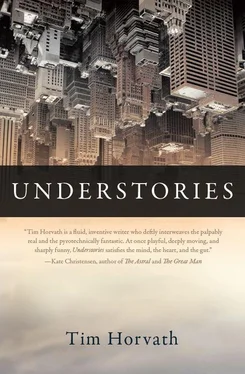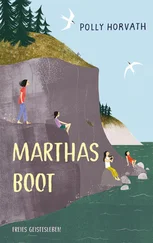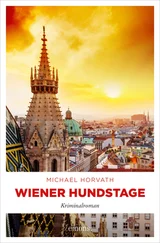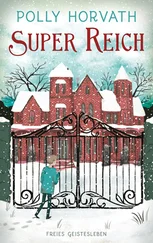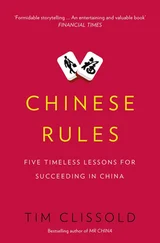
In the city that was in denial that it was a city, they used the expression “sweet hickory borne on the wind” often, but most of all on days when the wind was carrying southeast from the waste-treatment plant.

Under a weird sky in which silvery pollution had congealed into a solid concavity, the city that was in denial that it was a city caught a glimpse of itself one day. For the first time ever in its existence, it was confronted with its gridlines, its fuming drivers, its onslaught of suits and ties, the dirt-encrusted blankets of its transients, its grayness, its dearth of smiles, heard its Ornette Coleman horn bleats and medley of languages and saw its garish mannequins and spattered canvases and its sleek triple jogging strollers and acres of paper. There was a silence as a citizenry entire gaped. The stock market, aka “the livestock market,” ground to a halt, and even the taxi meters knew to freeze. After a while, a fog started to creep, then roll in off the ocean, shrouding everything. The collective exhalation (which took several minutes) was powerful enough to sate ten thousand hickories, carrying enough of their scent to make cities hundreds of miles away weep.
My father is semiporous. Even now that he’s been fully disassembled and the schematics rendered in a dizzying cross section, he remains largely unknowable to us. Once we spun tops in the shadow of his rocking chair, which turned out to be an optical illusion triggered by the elaborate arrangement of pieces of wood that did not resemble a chair whatsoever when gazed at directly, and why why would he do such a thing the same question we asked every time we gauged his charged breath for negative ions not excluding alcoholic ones or caught him slipping sawdust from his pocket into the meringue. Oh, his pocket. Plural: Pocket. Not pockets. Pocke t —like deer, like moose. His coinage. I can hear him rage still at those times when, still young, we threw an s onto the end; I can see his flaring hair and contorted features dappled with benday dots like a comic-book villain as he came after us. Other than that, an unstinting pacifist mostly occupied with his many pocket. The fatal gift of the multipocketed vest one year started it; we could only watch wide-eyed as his obsession mounted, first with the stashing away of wrapper detritus clip coin oil subsidy paperwork in existing pocket, then the construction of new pocket, pocket stitched lovingly and then stapled hastily and then merely outlined in Sharpie, “Home of Future Pocket,” unceremonious groundbreaking followed by new pocket springing up like housing, whole subdivisions eventually, Pockettown, the continual fractionation of slottable space, eat your heart out Zeno. Infinite places where things could be lost and found, places where things could stay hidden and accrue scruff, fuzz, and legend, places where things could fester, mold, and potentially molt, places a person could go lost for years, the only trace a rivulet of sardine juice spilling down the smooth side of a shirt they wore but a single time, unless, that is, you count memory.
_____ (1) Pockets are like subway cars — profoundly democratic, messy, jumbled and crammed. Silver bracelet rubs elbows with snot-fed Kleenex and clings to its strap.
(2) I borrowed a friend’s coat and then he moved to Florida, so it is mine now. But it is pocketless. Sometimes I flail like an infant at the sides as if that might conjure them into being.
(((()))) If the string theorists are right, the universe teems with hidden dimensions; pockets abound. To make even a single new one, then, is to play at being God.
1. Crossing Tahiti off his itinerary, Gauguin heads instead for points north in his gambit to ditch civilization. The more his mind has lolled in the tropics, the more convinced he’s become that the languorous heat, syrupy voyeurism, and ornate adzes will merely reiterate Parisian clamor and clutter sans the solace of steaming coffee and pain. Greenland — now that promises true primitivism. Shifting ice tetrahedrons, shuddering rumbles, and terns’ glancing landings will translate nature morte more exactly than gaudy mangoes.
2. At Sennelier, he stocks up on paint: first the blancs, de Troyes, de Lunare, de céruse, d’argent, crème, ivoire, and then some rouge and marron, and even, in case there’s some verity to the name, vert malachite. He procures wool skeins & the least imposing harpoon he can find.
3. Arrives tremulous in port of Nuuk, a longhaired French bohemian in a cowboy chapeau. For months, he has scrutinized salt form from his table’s edges, model clumps and ice glares he built to apprentice himself. Still, the real ones nearly blind him. Blinking and muttering profanities, he catches laughter from sources he can’t tie a line to. All this numbness, and yet these sting. From children, the three-pronged bombardment — stares, jeers, and a single snowball — fazes him only till his eyes return. He imagines they are critics from the Sorbonne and doffs his hat with a contemptuous flourish.
4. Dinner with the governor. In awe of the plushness of the quarters with which they’ve provided him. He struts his title of “painter in residence.” The commissions will surely start rolling in. Any day now. He writes as much to Mette, to whom he is still wedded, making sure to include a special note to Aline, favorite daughter, his maman ’s namesake. One day he intercepts whispers about a meat market. When he inquires, his hand is made a map by calloused fingers, but at the appointed hour, parting the beads, he finds naught but putrid piles of fish. He purchases one so as not to offend and wonders if he can render paint from their oil, the metallic glow like souls still hovering around their corpses.
5. It’s not too hard to find revelers to gambol with under midnight sun. What Impressionists could do with this light; what Vincent would do with it! This long hair, he thinks, must go — it freezes stiff, like his brushes. But no, he catches himself after a swipe with the paint-flecked razor; how impetuous, what madness to bare his scalp to such conditions. Commissions, too, have frozen, leaving his strokes brusque and scattered. One morning, he decides he’s a Shiverist, an offshoot of Pointillists, but by afternoon he retracts it: too derivative of Seurat and “his damned dots.” Which to learn — Danish, Norse, or one of the Inuit tongues? Wavering, he makes sentences from slats of each and is permutatively misunderstood. Regaling the locals with stories of his time in Copenhagen, he never knows they’ve pegged him as a Danish spy. Behind his back: “Gauguile.”
6. Nauseated by niceties, he trades his lavish room for a turf hut — lean, gray, away from the heart of town. The light is relentless, it finds him, harasses him, and yet he can’t cease thinking of dark skin buried under textile strata. A centimeter’s exposure here is the purest coquetry.
7. Nuuk has too much of the waft of Copenhagen; he must find the prelapsarian, the primordial. This hunger and a kayak bring him to craggy Kangeq, twelve kilometers distant, the Giverny of the late Aron von Kangeq, a painter, an Inuit master, he decides. He makes it his business to see some Kangeqs. Mon Dieu ! Is that walrus attacking the nude woman or is it performing cunnilingus on her? Is the man at her side attempting rescue or cheering both on? Returning to Nuuk, he will allow himself to be tutored by this tupilak, will in short order produce his own Manao Tupapau. Which will shock Paris more — the girl whose nubility he makes no attempt to obscure, or the hooded walrus looking on, big death longing for little death?
Читать дальше
